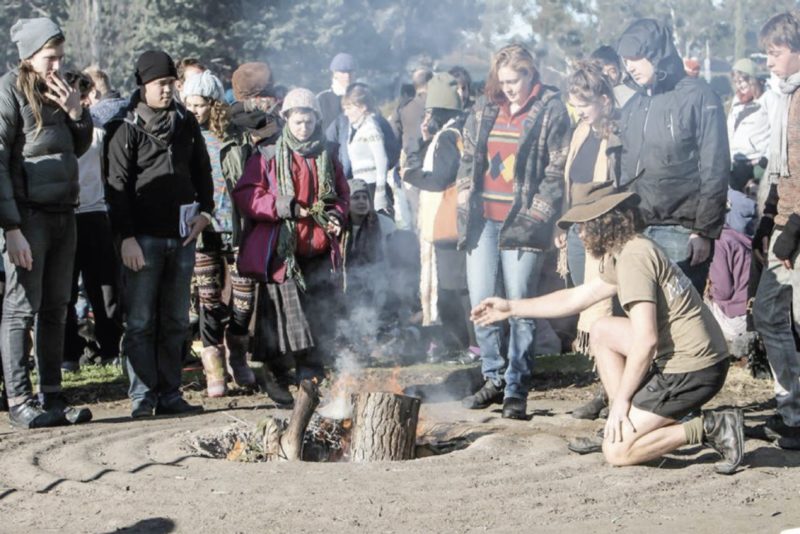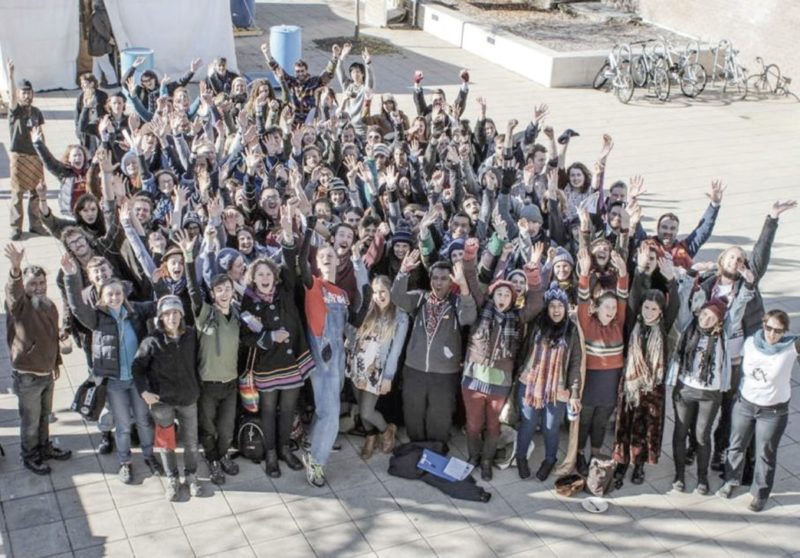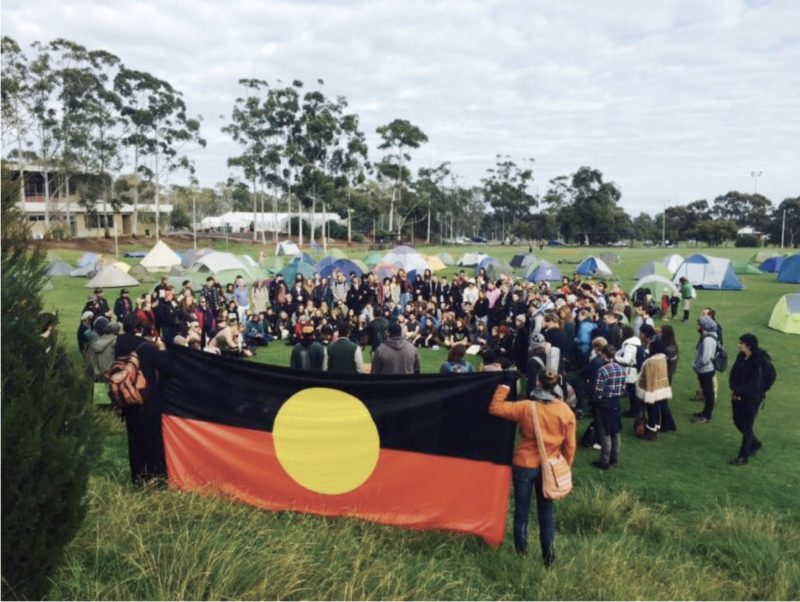SOS is Students of Sustainability, a unique, social and environmental justice gathering held every July by the Australian Student Environment Network (ASEN). It started in 1991, in Kamberra (Canberra) with a small group of ANU undergraduates. Since then it has taken place every year and has grown and evolved over the years. It is an event that continues to inspire people that ANOTHER WORLD IS POSSIBLE. It is more than a conference with workshops. Participants generally camp over the five days at the host university or TAFE or, in the case of the 2014 SOS, at the Canberra Aboriginal Tent Embassy. This allows the students to experience not only what it’s like to learn together, but to live with each other, with all the challenges and joys that encompasses.
Let me take you to the SOS Conferences of my memories. You arrive on the site (often a university or TAFE) to find cars packed to the brim with camping gear. Some people have even made the journey on bikes! It’s winter so there’s usually people milling about with hot drinks, dressed in lots of colourful knitted wear and beanies. Maybe you’re excited to see friends from around the country you only see once or twice a year. Or perhaps it’s your first year and you are feeling a bit overwhelmed by all the new people and experiences.
You are greeted at the registration desk by a fellow participant who has elected to do a volunteer shift and pick up a program before heading to set up your tent. Then it’s dinner time: a hearty meal prepared by volunteers and the kitchen legend, Bretto. Maybe you’ll listen to some announcements or talks or music as you mingle and feel sleepiness slowly greet you over a cup of chai. Eventually you head to your tent for your first night at camp.
The next morning is one of the most important events—the welcome to country by the traditional custodians of the land on which we are meeting. There’s a smoking ceremony. People often remove shoes and socks, connect their body with the earth, take the time to feel respect and gratitude to the people who are welcoming us. Green gum leaves create smoke that cleanses as we create a line and wash ourselves in the smoke and make connections with the elders and other First Nations people we are meeting and being welcomed by. Birds often fly overhead; the quiet silence of the ceremony encouraging reflection. The next five days are full. Everyday there are workshops (on everything from uranium mining, environmental activism, mental health, gender, feminism, queer politics, critical race, disability activism, political economy, campaign skills, dumpster diving and so much more), excursions to visit nearby food forests and sustainable housing initiatives, parties, open mic performances, dance offs, and all manners of joyful activities in which you can partake. There are also quieter areas if you are feeling introspective or are craving solitude.

It’s a full program. But you are encouraged to spend time outside of workshops too. Perhaps one morning you are rushing, compelled to go to yet another fascinating workshop, but on your way you walk past the kitchen and something about the vibe calls you in… you find yourself peeling vegetables while swapping knowledge and chatting to the kitchen volunteers. You feel grounded and centred from using your hands to nourish your friends and the rest of the conference. Helping makes you feel included and proud that you are part of the running of the conference.
Patterns are formed over the next few days as you live and learn together. You might find a buddy who is also filling up their hot water bottle by the fire before bed. Or become part of the early rising crew who lights the morning fire for cups of tea. You might have decided to volunteer for a group such as the grievance collective which calls on your personal and political skills to help those around you.
For me, I often feel a bit overwhelmed at first and unsure of my place, but by the 4th or 5th day, there is a beautiful joyful energy amongst people and a palpable sense of community. I am usually dreading the end and having to go back to “normal life”. Feeling emotionally and intellectually nourished and happy to be living in a like-minded community, I want to stay at SOS forever.
Please keep in mind that I write from the perspective of a white person who has been part of ASEN for many years now. I think that many others would have a very different experience. And whilst I believe SOS has positive impacts on the world, there are always things it can improve on.
What is repeatedly praised and commended at SOS is the presence of incredibly passionate and intelligent First Nations people. Their contribution makes SOS what it is and is probably the most valuable thing about the conference. One example is a workshop called ‘Brown Eyes, Blue Eyes’, facilitated by Mitch who (with the participants consent) simulates the experience of being Aboriginal in a white settler classroom. It is one of the most sobering and intense experiences I have ever had; awfully real in so many ways. I have never felt the visceral feelings of humiliation and injustice like I did for that mere hour in the room with Mitch. I felt honoured to have been able to experience the pioneering work of First Nations people so generously putting huge amounts of effort into giving white people a glimpse of the perspective of First Nations people. SOS is, in many ways, an opportunity to have one’s privilege challenged and to realise that many people who consider themselves Australians are in fact part of a settler society and that this society is an ongoing occupation of lands. People learn, often for the first time, that this occupation is being resisted. Meeting people who make you think differently and deeply starts you off on what might become a lifelong project. It’s an opportunity for everyone to meet faceto-face and discuss these issues and brainstorm constructive ways to move forward. Whilst it sounds heavy, it’s an opportunity to address the horrors on which this society has been built, which is necessary to begin to feel optimistic about our shared future.
At SOS, you come across ideas you might not otherwise be exposed to. For example, discussing in a safe place how to practice consent in your relationships. It is also often, though not always, peer-to-peer learning. So you learn from academics as well as your peers and from elders. If you have something to share you are encouraged to run a workshop. That encouragement is really wonderful and gives people confidence to deepen and share their knowledge. ASEN try to create an environment where people are encouraged to participate— challenging a lot of the barriers and power dynamics often present in wider society. People describe the joys of being together with like-minded people, learning collectively and being able to share opinions and test new ideas in a safe environment. A lot of vital things are often learned through conversation; learning is relational and we learn collectively.
There is also usually an opportunity to take action on an issue you have learned about, to put theory into practice. This may manifest as a rally or similar action through main streets. There is also a post-SOS road trip that visits communities affected by environmental destruction. This provides an opportunity to meet and talk with a large variety of people working to change society. Students may even get involved in resisting the damage a corporation is doing to the community whilst being supported by peers and activists who have more experience.
SOS is a diverse mix of many different types of activism and justice issues and is run by a new group of people every year. The conference’s recurring nature means it stays up-to-date and people are continually upskilled. ASEN focuses on anarchic political practices and decentralized, non-hierarchical organizing. For example, everyone is encouraged to learn facilitation skills and other techniques that reduce and challenge hierarchies as they appear and encourages organisational self-examination. SOS is a place to learn some foundational skills for the world we are trying to build where power is not guarded by the few and democracy actually exists. The politics and skills learned at ASEN spill out more widely in society and in other organising spaces. For example, activists express criticisms of NGOs who may have undemocratic, hierarchical organising methods. SOS is lucky to have long-term connections to diverse counterculture communities across so-called Australia—people who have been resisting oppression in their own community and in their own ways. This is one of the ways that SOS experiments with DIY and horizontalism.
People have commented that they find SOS camps more grounded than your typical academic conference. There is a relaxed vibe, nature and campfires. Which is good because it reminds us that we humans are connected with nature and puts that into practice. It’s a workshop conference, but it’s also a celebration, a camping trip, and simply a nice place to live for five days. Many people make connections that last years or lifetimes because of the meaningful experiences they have exploring issues they care about.
When thinking about changing the world, the fact is that the world is changing, but for who? Or in whose interests? SOS is a reminder that we are not just observers of that process but active participants and co-creators, should we so choose.
It is a demonstration that humans are generally much more capable than our capitalist culture of passive consumption and obedience would suggest. The students run the conference, they have collectives to deal with conflicts. This initiates and builds strong relationships and community links, which often continue in other community work and projects. One of the most powerful things SOS has done for many people is to provide hope. It is a demonstration that the world we exist in could be more communal and a nicer place to live. That humans are capable of more.
For more information go to http://asen.org.au or search Facebook for ‘ASEN organisers’.


